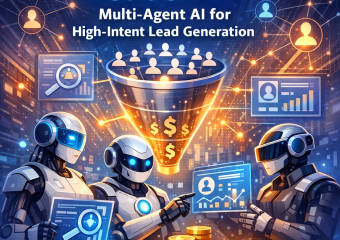AI Revolutionizes Local Sales: Discover Must-Have Strategies
The Rise of Proximity-Based Lead Generation: How AI Is Reshaping Local Sales
Proximity-Based Lead Generation: A New Dawn for Local Business Growth
In the evolving landscape of digital marketing, proximity-based lead generation has emerged as a groundbreaking strategy, particularly for local businesses seeking to boost their sales footprint. This tactic leverages the power of geolocation technology combined with artificial intelligence (AI) to identify and engage potential customers based on their physical proximity to a business. As businesses scramble to gain a competitive edge, AI’s role in refining and enhancing these strategies has proven indispensable, fundamentally changing how local sales are approached.
Understanding Proximity-Based Lead Generation
At its core, proximity-based lead generation involves targeting potential clients who are within a certain geographic range of a business’s location. This method ensures that marketing efforts are concentrated where they can deliver the most impact. Traditionally, local businesses relied on broad-spectrum advertising methods such as flyers and local newspaper ads. However, the integration of AI has transitioned these efforts to a more sophisticated, data-driven approach.
AI enhances proximity marketing by analyzing vast amounts of data to identify patterns in consumer behavior, preferences, and mobility trends. This capability allows businesses to not only target users based on location but also tailor their marketing messages to match the audience’s predicted needs. For instance, a coffee shop can send promotional offers to a user’s smartphone just as they enter a nearby area known for high morning foot traffic.
AI’s Role in Enhancing Local Customer Engagement
The real-time processing power of AI transforms proximity marketing from a passive strategy to an active, dynamic engagement tool. AI systems can instantly analyze the context of a customer’s location and send personalized marketing messages at the optimal time. For example, AI can enable a restaurant to send lunch offers to people within a one-mile radius just before noon, capturing the attention of potential customers exactly when they’re deciding where to eat.
Moreover, AI-powered analytics platforms can track the effectiveness of proximity-based campaigns in real-time, allowing businesses to quickly adjust their strategies based on what’s working. This level of agility is crucial in today’s fast-paced market environments where consumer preferences can shift abruptly.
Challenges and Considerations
Despite its benefits, implementing AI-driven proximity-based lead generation isn’t without its challenges. Privacy concerns are paramount, as businesses must navigate regulations such as GDPR in Europe or CCPA in California, which govern the use of personal location data. Ensuring transparency about data usage and maintaining robust data security measures are essential to gain and retain consumer trust.
Additionally, the effectiveness of proximity-based lead generation relies heavily on the accuracy of the geolocation data and the AI algorithms used to process this information. Businesses need to invest in high-quality technology and expertise to harness the full potential of AI-driven proximity marketing.
Future Prospects and Strategic Advantages
Looking ahead, the scope of AI in proximity-based lead generation continues to expand. Emerging trends include the integration of augmented reality (AR) to create more immersive marketing experiences directly linked to a user’s location. Imagine pointing your smartphone at a shop and seeing current promotions in augmented reality or even trying out products virtually.
For local businesses, the strategic advantages of adopting AI-driven proximity marketing are clear. It not only brings efficiency and precision to marketing campaigns but also enhances customer experiences, leading to higher conversion rates and brand loyalty. The ability to engage with potential customers personally and contextually provides a significant edge in today’s competitive market.
Conclusion
The rise of proximity-based lead generation marks a significant shift in how local businesses approach sales strategies. With AI at the helm, these modern marketing efforts are not only more targeted and efficient but also aligned with the ever-changing dynamics of consumer behavior. As technology continues to evolve, so too will the capabilities of local businesses to attract, engage, and retain customers through innovative, AI-powered solutions. Embracing these advancements could very well be the key to unlocking new growth avenues and achieving sustained business success in the digital age.






